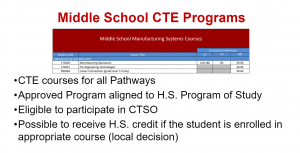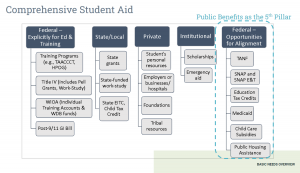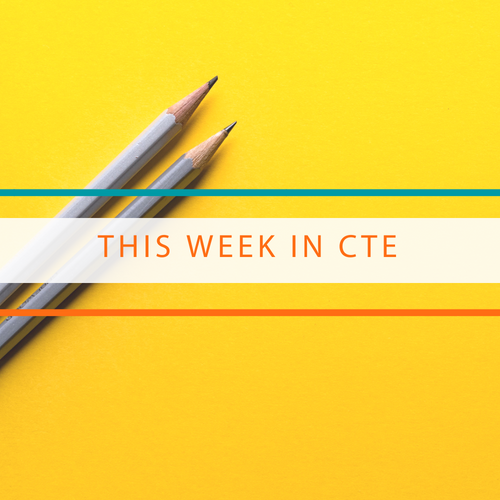In September, Advance CTE and ECMC Foundation announced the second cohort of The Postsecondary State Career Technical Education (CTE) Leaders Fellowship at Advance CTE—Sponsored by ECMC Foundation. The Advance CTE — ECMCF Fellows include representation across multiple demographic categories reflecting the Fellowship’s goal of intentionally building a postsecondary leadership pipeline for underserved populations in Career Technical Education (CTE) that closes racial representation gaps and removes equity barriers to postsecondary leadership advancement.
This post continues our series to introduce each Fellow participating in the second cohort of emerging leaders from 14 states, including 12 professionals of color.
 Kayla Brossett, Louisiana
Kayla Brossett, Louisiana
Kayla Brossett has more than a decade of experience designing and managing strategic industry partnerships, with a specialty in workforce development, diversity, equity, inclusion, and student career services. Currently, she serves as the US Director of Employer Partnerships at the Wadhwani Foundation. She earned a bachelor’s degree in journalism from Northwestern State University and a master’s degree in communications from Grambling State University.
 Jomarie Coloriano, Wisconsin
Jomarie Coloriano, Wisconsin
Jomarie Coloriano’s professional experience is deeply influenced by her passion for social justice and systems reform. She has received multiple accolades for her work in diversity, equity, and inclusion and student support including being named the 2021 Gateway Technical College DEI Champion, the National Association of Student Personnel and the Administrators NOW 2020 Professional in Inclusion, Currently, she serves as a Multicultural Support Specialist at Gateway Technical College and an adjunct faculty member in the School of Liberal Arts and Sciences and School of Protective and Human Services. Jomarie is also a doctoral candidate in the Leadership for the Advancement of Learning and Service program at Cardinal Stritch University.
Yolanda Flores, Florida

Yolanda Flores specializes in supporting and preparing refugee and migrant learner populations for secondary and postsecondary success. Her more than two decades of experience include an instructor, school administrator, grants coordinator, and special populations program administrator. Currently, she serves as Administrative Director for Postsecondary, Adult & Community Education for Collier County Public Schools. Flores earned a bachelor’s degree in social science education from the University of Central Florida and a master’s degree in educational leadership from the University of South Florida.
Amy Hodge, Policy Associate


 Career advising and development supports geared towards middle grades learners to improve access and achieve high-quality and equitable secondary CTE programs prove to be an early opportunity to develop an occupational identity and better build social capital. Ohio discussed the policy structures the state has put into place to support learners in CTE programs before they enter high school, including funding mechanisms and alignment of middle grades programs of study. Michigan Advance CTE-ECMC Fellow
Career advising and development supports geared towards middle grades learners to improve access and achieve high-quality and equitable secondary CTE programs prove to be an early opportunity to develop an occupational identity and better build social capital. Ohio discussed the policy structures the state has put into place to support learners in CTE programs before they enter high school, including funding mechanisms and alignment of middle grades programs of study. Michigan Advance CTE-ECMC Fellow  An education consultant and a state leader from Wisconsin provided an overview of programs that support learners basic needs, while elevating that many programs still create barriers for learners to complete credentials. Immediate next steps that were shared included making integrated benefits applications for federal assistance programs available online and inviting benefits coordinators to provide services on campus. Wisconsin highlighted their steps to create affinity groups with faculty and staff, with Dr. Colleen McCabe stating “To understand the effects of poverty, you have to explore learners’ multiple identities.”
An education consultant and a state leader from Wisconsin provided an overview of programs that support learners basic needs, while elevating that many programs still create barriers for learners to complete credentials. Immediate next steps that were shared included making integrated benefits applications for federal assistance programs available online and inviting benefits coordinators to provide services on campus. Wisconsin highlighted their steps to create affinity groups with faculty and staff, with Dr. Colleen McCabe stating “To understand the effects of poverty, you have to explore learners’ multiple identities.” Congress Nears Agreement on Nation’s Debt Limit
Congress Nears Agreement on Nation’s Debt Limit In April 2021, Advance CTE released
In April 2021, Advance CTE released  With a focus on recruitment and retention, it is important for learners and families of CTE to see success stories of individuals who look like them and share similar educational, racial, socio-economic, gender and geographic backgrounds.
With a focus on recruitment and retention, it is important for learners and families of CTE to see success stories of individuals who look like them and share similar educational, racial, socio-economic, gender and geographic backgrounds. Families and learners both participating in and considering CTE highly value an education experience that allows learners to explore opportunities after high school that lead to college and career success. In this example, Utah used graphics of learners engaging in real-world skills training to promote its Auto Mechanics and Repairs career pathway. This is a way of demonstrating the connection from CTE courses, work-based learning settings and youth apprenticeship programs to career success.
Families and learners both participating in and considering CTE highly value an education experience that allows learners to explore opportunities after high school that lead to college and career success. In this example, Utah used graphics of learners engaging in real-world skills training to promote its Auto Mechanics and Repairs career pathway. This is a way of demonstrating the connection from CTE courses, work-based learning settings and youth apprenticeship programs to career success. Using local examples can help explain the nuts and bolts of how CTE delivers success by making the connection between CTE and a specific career or industry, as well as highlighting partnerships with local colleges and employers that are recognizable to parents/guardians and learners.
Using local examples can help explain the nuts and bolts of how CTE delivers success by making the connection between CTE and a specific career or industry, as well as highlighting partnerships with local colleges and employers that are recognizable to parents/guardians and learners. Wisconsin CTE showcased CTE to parents/guardians and learners by lifting up student success stories. One avenue to find compelling learner examples is to coordinate with statewide or local Career Technical Student Organizations (CTSOs) and gather testimonials, photos and stories to share on social media. This tweet focused on a local learner success story to create human interest in CTE. To help expand the reach of this tweet, Wisconsin CTE used relevant hashtags and tagged the state CTSO and the university the learner was attending. This type of post is a great way to highlight CTE and the many ways CTE benefits learners.
Wisconsin CTE showcased CTE to parents/guardians and learners by lifting up student success stories. One avenue to find compelling learner examples is to coordinate with statewide or local Career Technical Student Organizations (CTSOs) and gather testimonials, photos and stories to share on social media. This tweet focused on a local learner success story to create human interest in CTE. To help expand the reach of this tweet, Wisconsin CTE used relevant hashtags and tagged the state CTSO and the university the learner was attending. This type of post is a great way to highlight CTE and the many ways CTE benefits learners.  Developed with input from nearly 200 national, state and local education and workforce development leaders and supported by 40 national organizations,
Developed with input from nearly 200 national, state and local education and workforce development leaders and supported by 40 national organizations,  Throughout the month of October, we will celebrate careers in construction. Utilize these classroom
Throughout the month of October, we will celebrate careers in construction. Utilize these classroom